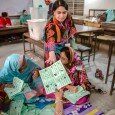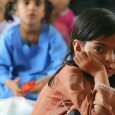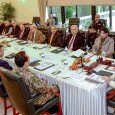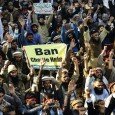By Ali Arqam –
The shocking killing of polio aid workers and the subsequent pullout of UN agencies have taken Pakistan back to Square One
A series of stunning attacks on polio aid workers leading to the death of nine persons, seven of them women and girls as young as 14, sparked a national outcry last month. So shocking was the violence it stunned the UN agencies into pulling out their staff but for the bereaved families of the victims it means more than just losing their loved ones.
They have fallen back in their struggle against economic hardships. Most of those killed were volunteers, who had the incentive of getting a measly thousand rupees (little over $10) for a day of training and three days of field work.
The income generated from participating in the campaign helped the deceased workers to chip in with something to help the family in what is like a never ending ordeal of day-to-day expenses. Due to the nature of job and low remunerations, very few are driven to it for economic reasons.
“The motivation for nearly all volunteers falls into one of four categories: (1) people who volunteer because their relative was an Area in Charge and needed reliable workers; (2) people in severe poverty; (3) people who were obligated to volunteer by a job in another government health sector (i.e. teacher), and (4) people who hoped that working for polio would lead to a job in the health sector.” — (SveaClosser UNICEF)
“I started out of obligation because these days there are so many problems and you can’t survive on one income. My husband doesn’t have a government job; he’s a day wage labourer. In a month, he earns about Rs5,000-5,500. It’s hard to live on that. So I thought if I earn a little money, it will be good. But you have to walk so far and you earn so little and even that long after you’ve done the work. That’s why I refused — I said I’m not doing it anymore.” — A former volunteer from Karachi
In the multi-billion dollar polio eradication campaign across the globe, Pakistan is placed as one of the priorities due to its presence in the list of three countries where the disease is endemic. But the 250,000 polio aid workers (LHW and Volunteers) have never been a priority. While executing the most substantial part of the whole campaign when it comes to compensation for their ground works and strivings, they are paid as low as half of the average monthly salary or daily wages of an unskilled labourer. The story of Madiha and Fahmida is not too different from the others. Hailing from the outskirts of Landhi Town, Gulshan-e-Buner both joined the vaccination team on the insistence of Fahmida’s niece and Madiha’s cousin, Gul Naz, a local health supervisor.
They were motivated by a relative as well as the opportunity to add to the family kitty. Madiha’s mother Rukhsana, too, had worked as a vaccinator though on the fateful day, she was not part of the campaign. Gul Naz, who saw the attackers kill her aunt and cousin, and herself ran over to a nearby home to save her life has left the job as she regrets the loss to her family—being part of the campaign.
“While executing the most substantial part of the whole campaign when it comes to compensation for their ground works and strivings, they are paid as low as half of the average monthly salary or daily wages of an unskilled labourer”
Naz has no hope of finding volunteers for her area in the future in the wake of the fatal incident. She also fears that in case of any such incident in future, she will be held responsible for endangering other people’s lives.
Muhammad Riaz, Fahmida’s husband, has lodged an FIR in Quaidabad Police Station against unknown assailants. Yet, he is not hopeful about tracing the assassins, pointing to the row of killings over the last four years in the metropolis with the assailants still at large and killings continuing unabated. A taxi driver by profession, Riaz denied his wife Fehmida and her nieces Madiha and Gul Naz had received prior threats for taking part in the campaign. He said, “I allowed my wife to work as an aid worker as she had other family members already taking part as well and the fact that she wouldn’t have to go too far.”
Madiha, a 20-year-old, was supporting her family with the meagre contribution. She had her hands, fingernails and toe nails dyed with traditional Henna. Her grief-stricken mother Rukhsana was crying hysterically seeing her body while putting her palms around Madiha’s face at Jinnah Hospital morgue.
“Naz has no hope of finding volunteers for her area in the future in the wake of the fatal incident. She also fears that in case of any such incident in future, she will be held responsible for endangering other people’s lives”
While holding the extremists elements responsible for the deaths of her daughter Madiha and sister Fahmida, she blamed it on the propaganda unleashed by clerics and rightwing publications about the adverse effects of polio vaccination.
Daily Ummat, a Karachi-based newspaper, recently published an extensive report on polio vaccination. The paper compiled all the propaganda material from lesser known and unreliable sources purporting to create harmful effects of polio vaccination, including infertility and physical disability.
The deadly attacks which have put paid to efforts against the endemic disease were allegedly orchestrated by the same set of militants, who have in the past attacked Corps Commander Karachi, killed members of Shia community in Kohistan and were involved in the 2009 Ashura bombing and another attack on a Shia procession in Qasba colony, both in Karachi.
Calling from an unknown location, its commander, Ahmad Marwat, told Radio Free Europe/Radio Liberty’s Radio Mashaal that polio vaccination was forbidden in Islam and the group would continue to target vaccination teams across Pakistan. Mustafa Qadri, a researcher for Amnesty International, says military operations in both Afghanistan and Pakistan have blurred the line between who are humanitarian workers and who soldiers. Sarah Crowe, a spokeswoman for UNICEF, says the best protection for aid workers is for their “humanitarian space” to remain independent from armed forces.
“Health workers or aid workers — in this particular case, polio vaccinators — must be protected at all times, and (that means) the space in which they operate must remain safe and free of any political interference whatsoever,” she says.
The ongoing war-on-terror, the conflicting narratives, conspiracy theories and hostility towards the West have created an environment of distrust and disarray, where any step from the government is viewed with scepticism and suspicion.
The state, which appears to have little interest in alleviating the people’s miseries, has yet to decide whether confrontation with armed militias with the same ideological moorings, and having support across the ethnic divide all over the country and in the urban centres should be based on some sort of classification and categorisation of militants.
The writer is a journalist based in Karachi






























































































